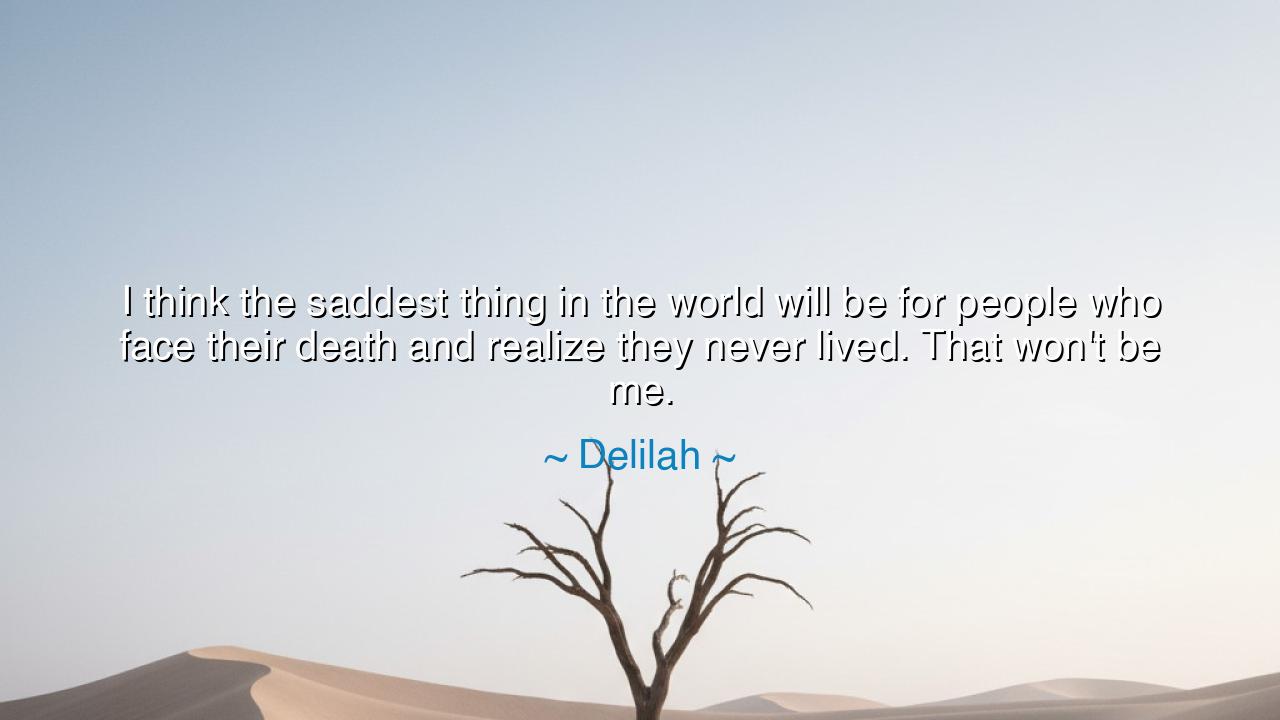
I think the saddest thing in the world will be for people who
I think the saddest thing in the world will be for people who face their death and realize they never lived. That won't be me.






The voice of the storyteller and sage, Delilah, once spoke these words that burn like a flame against the silence of complacency: “I think the saddest thing in the world will be for people who face their death and realize they never lived. That won’t be me.” In this declaration, there resounds the cry of the fully awakened soul, the spirit that refuses to drift through life half-asleep. Her words are not merely about death — they are about presence, about the courage to live with intention, to seize each moment as sacred, and to reject the quiet tragedy of an unlived life. For she understands, as the ancients did, that to exist is one thing, but to live is another — and far fewer ever achieve it.
From the dawn of time, humanity has struggled between two paths: one of comfort and conformity, the other of awakening and purpose. Many walk through their years as though life were a long corridor, never stopping to marvel at the doors that open along the way. They survive, but they do not live. They obey, but they do not dream. It is only at the end — when the shadow of mortality stretches before them — that they realize how much of life has slipped quietly through their fingers. Delilah’s words strike at this very truth. She rejects the numbness of habit, declaring that she will not reach her final hour with regret, that she will not be among those who die wondering what might have been.
The meaning of her statement is simple, yet profoundly human: that the true death is not the moment when the body fails, but when the heart ceases to feel and the spirit ceases to grow. To “never have lived” is to have traded wonder for safety, passion for convenience, and truth for approval. The saddest thing, she says, is not death itself, but a life unlived — a life where one has never dared to love deeply, speak honestly, create boldly, or forgive freely. Hers is a battle cry for the living, a call to awaken from the sleep of routine and to live so fiercely that death, when it comes, will find us fully spent yet fully fulfilled.
History is filled with souls who embodied this truth. Consider Joan of Arc, a young girl who chose to follow the fire of her conviction even when it led her to the stake. Though her body perished at nineteen, her spirit burned brighter than the flames that consumed her. She did not live long, but she lived completely — with purpose, courage, and unshakable faith. And in contrast, history also tells of kings and princes who reigned for decades yet died hollow, having never touched the essence of their own souls. Such is the difference between living and merely surviving. Joan’s short, fierce life shames the long, empty lives of those who mistake longevity for meaning.
The origin of Delilah’s wisdom comes from her long years of listening to the hearts of others. As a radio host whose voice has comforted millions, she has heard countless confessions of regret — the “what-ifs,” the “I should have’s,” the unspoken dreams buried under fear. Her words spring not from theory but from witnessing the quiet grief of those who wake too late. When she says “that won’t be me,” it is both promise and defiance — the vow of one who chooses to live fully, to embrace joy and sorrow alike, to make each day a hymn of gratitude and daring. It is the ancient creed of those who refuse to die before they have truly lived.
But to live fully, as Delilah implies, is not always easy. It demands that we confront our fears, that we face rejection, that we walk unfamiliar paths. It asks that we love even when love risks pain, that we forgive even when it feels impossible, and that we dream even when the world teaches us to settle. Living, in its truest form, is not comfort — it is courage. It is waking each morning with the question, “What will I create today that will outlast my breath?” and ending each evening with the peace that comes from having tried. It is to let the heart lead, not the fear.
The lesson, then, is clear: Do not wait for life to find you — go and claim it. Do not live as if tomorrow is guaranteed, for each dawn is a gift wrapped in uncertainty. Speak the truth you have swallowed. Take the journey you have postponed. Love the people who matter now, not later. If you fall, fall boldly; if you fail, fail beautifully; for these too are signs of the living. Remember always that death comes to all, but not all who die have truly lived. Delilah’s words challenge us to ensure that when the final hour comes, we may look back not with regret, but with gratitude — knowing that we drank deeply from the cup of existence.
Thus, Delilah’s voice joins the eternal chorus of wise souls who teach that life’s tragedy is not mortality, but mediocrity of spirit. Her vow — “That won’t be me” — is an anthem for all who would live awake, alive, and unafraid. So take her words to heart, children of time: fill your days with meaning, your nights with peace, and your years with wonder. Let your life be so rich in love, courage, and purpose that when death comes, it will not find you unprepared — it will find you already fulfilled, already alive, already immortal through the legacy of your living.






AAdministratorAdministrator
Welcome, honored guests. Please leave a comment, we will respond soon